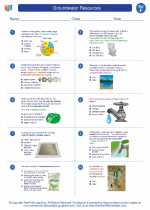Groundwater Resources -> water balance
Water Balance
Water balance refers to the regulation of the amount of water in the body to maintain a state of equilibrium. The human body constantly loses water through processes such as breathing, sweating, and urination, and it is important to replenish this lost water to prevent dehydration. At the same time, excessive water intake can lead to overhydration, which can also have negative effects on the body. Therefore, the body carefully maintains a balance between water intake and water loss to ensure optimal functioning.
Factors Affecting Water Balance
Several factors influence water balance in the body, including:
- Fluid intake: The amount of water and other fluids consumed through drinking and eating.
- Fluid loss: The water lost through processes such as urination, sweating, and breathing.
- Environmental conditions: Temperature, humidity, and altitude can affect the rate of fluid loss through sweating and respiration.
- Physical activity: Exercise and physical exertion can increase the amount of fluid lost through sweating.
- Hormonal regulation: Hormones such as antidiuretic hormone (ADH) and aldosterone play a role in regulating water balance in the body.
Importance of Water Balance
Maintaining proper water balance is crucial for the body to function optimally. Water plays a key role in various physiological processes, including:
- Transport of nutrients: Water helps transport nutrients and oxygen to cells and tissues.
- Temperature regulation: Water assists in regulating body temperature through processes such as sweating and vasodilation.
- Waste removal: Water is essential for the excretion of waste products through urine and sweat.
- Lubrication of joints: Adequate water intake helps maintain the lubrication of joints and tissues.
- Cellular function: Water is involved in various cellular processes and is a key component of the body's cells.
Study Guide
To understand the concept of water balance, consider the following study guide:
- Define water balance and explain its significance in maintaining overall health and well-being.
- Identify the factors that influence water balance in the body and describe how each factor contributes to the overall equilibrium of water.
- Explain the role of hormones in regulating water balance, focusing on the functions of antidiuretic hormone (ADH) and aldosterone.
- Discuss the potential consequences of imbalanced water intake, including dehydration and overhydration, and their impact on the body.
- Describe the importance of maintaining proper water balance for specific physiological processes such as nutrient transport, temperature regulation, waste removal, and cellular function.
By mastering the concept of water balance and its implications for overall health, you will gain a deeper understanding of the body's intricate mechanisms for maintaining equilibrium and the importance of making informed choices regarding fluid intake and hydration.
.◂Science Worksheets and Study Guides Sixth Grade. Groundwater Resources

 Worksheet/Answer key
Worksheet/Answer key
 Worksheet/Answer key
Worksheet/Answer key
 Worksheet/Answer key
Worksheet/Answer key
 Vocabulary/Answer key
Vocabulary/Answer key
 Vocabulary/Answer key
Vocabulary/Answer key
